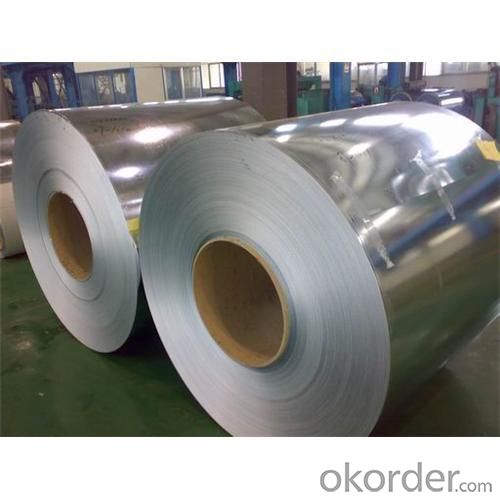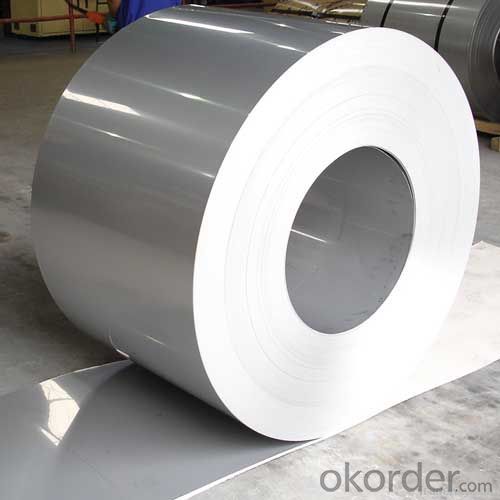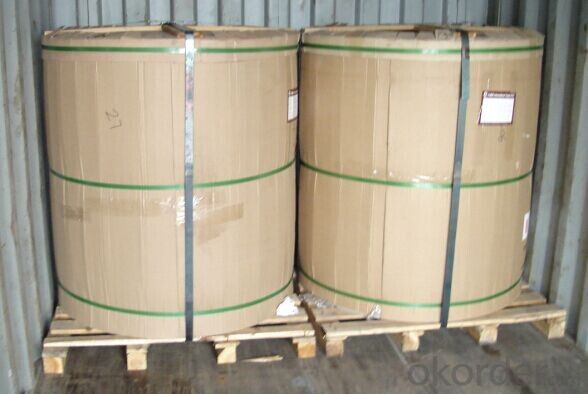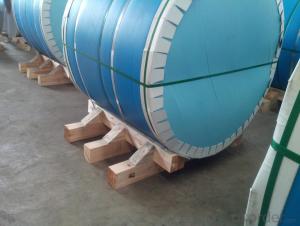DC Mill Finished Aluminum Coil with High Quality
- Loading Port:
- Shanghai
- Payment Terms:
- TT OR LC
- Min Order Qty:
- 5 m.t.
- Supply Capability:
- 10000 m.t./month
OKorder Service Pledge
OKorder Financial Service
You Might Also Like
Item specifice
1. Specification of DC Mill Finished Aluminum Coil with High Quality
Material | Alloy Aluminum 6063,6061,6005 or customer nominated |
Temper | T3, T4, T5, T6 |
Surface | Anodize, electrophoresis, powder coating, PVDF coating, wood grain painting, matted, etc. |
Colour | Any colour based on Standard Germany RAL Mark |
Length | Coating 6.5 meters, Anodizing 6.5 meters, Mill finish 5 meters |
Press Machine | 500-4000 tons all together 64 press lines. |
Fabrication | 1. Windows and doors; 2. Drilling; 3. Bending; 4. Cutting; 5. etc. |
Certificate | ISO 9001 |
Moulding | 1. Using our moulds, no fee; |
2. Using customer drawing, opening mould, usually about 10~50 tons then the moulding can be refunded. | |
3. Mould cost is negotiable base on the order quantity | |
Capability | Annual output 100,000 tons |
2. Application of DC Mill Finished Aluminum Coil with High Quality
(1).Interior: wall cladding, ceilings, bathrooms, kitchens and balconies, shutters, doors...
(2).Exterior: wall cladding, facades, roofing, canopies, tunnels,column covers , renovations...
(3).Advertisement: display platforms, signboards, fascia, shop fronts...
3. Feature of DC Mill Finished Aluminum Coil with High Quality
*Such coil is specially designed to replace aluminum ingot, due to the high export tax of aluminum ingot, the coil has better price than ingot.
*This type of coil can fit customer's remelting furnace just like ingot, no need to make any change to the production line that was previously used for ingot. The standard coil size and weight is very suitable for the feed gate of furnace.
*This type of coil causes less material wastage than ingot when remelted.
*Our coil is made directly from ore, no need to go though the ingot making process, quality is much better than other suppliers who use ingot scrap to make coil.
Be free from Oil Stain, Dent, Inclusion, Scratches, Stain, Oxide Dicoloration, Breaks, Corrosion, Roll Marks, Dirt Streaks and other defect which will interfere with use
4. Certificate:
SGS and ROHS(if client request, paid by client), MTC(plant provided), Certificate of Origin(FORM A, FORM E, CO), Bureau Veritas and SGS (if client request, paid by client), CIQS certificate
5. Image of DC Mill Finished Aluminum Coil with High Quality



6. Package and shipping of DC Mill Finished Aluminum Coil with High Quality
eye to wall
eye to the wall
with wood pallet (wooded case also available)
7. FAQ
1) What is the delivery time?
Dpends on actual order, around 20 to 35 days
2)What is the QC system:
We have QC staff of 20 persons and advanced equipment, each production is with MTC traced from Aluminum ingot lot.
3) What market do you mainly sell to?
Australia, America, Asia, Middle East, Western Europe, Africa etc
- Q:What is the typical thickness of aluminum coils?
- The typical thickness of aluminum coils can vary depending on their intended use and application. However, in general, aluminum coils are available in a range of thicknesses, typically ranging from 0.006 inches (0.15 mm) to 0.25 inches (6.35 mm). The specific thickness required for a particular project or industry will depend on factors such as the desired strength, flexibility, and weight of the aluminum coils.
- Q:How are aluminum coils used in the automotive industry?
- Due to their numerous advantages over traditional materials, aluminum coils play a crucial role in the automotive industry. They are widely used in various parts and components of vehicles, enhancing performance, improving fuel efficiency, and reducing overall weight. A primary application of aluminum coils in the automotive industry is in the manufacturing of heat exchangers, such as radiators and condensers. Aluminum's excellent thermal conductivity enables efficient heat transfer, regulating engine temperature and optimizing performance. By incorporating aluminum coils in heat exchangers, vehicles can achieve better cooling efficiency, preventing engine overheating and maintaining optimal operating conditions. Furthermore, aluminum coils are utilized in the production of air conditioning systems, specifically in the condenser and evaporator units. These coils have excellent heat exchange capabilities, enabling efficient cooling or heating of the vehicle's interior. As a result, vehicles equipped with aluminum coil-based air conditioning systems can provide a comfortable environment for passengers while minimizing energy consumption. Moreover, aluminum coils are used in constructing lightweight body panels and structural components like doors, hoods, roofs, and chassis. Aluminum's high strength-to-weight ratio makes it ideal for reducing vehicle weight without compromising structural integrity. This weight reduction leads to improved fuel efficiency, reduced emissions, and enhanced performance in acceleration, handling, and braking. Additionally, aluminum coils find application in producing electrical systems in automobiles. Their excellent electrical conductivity makes them suitable for wiring harnesses, connectors, and other electrical components. The use of aluminum coils in these systems ensures efficient transmission of electrical signals and reduces overall vehicle weight, contributing to improved fuel economy. In conclusion, aluminum coils are extensively used in the automotive industry for various purposes, including heat exchangers, air conditioning systems, body panels, and electrical components. The exceptional properties of aluminum, such as thermal conductivity, strength-to-weight ratio, and electrical conductivity, enable automakers to produce lighter, more efficient, and environmentally friendly vehicles.
- Q:can you use the Brasso Aluminum cleaner on aluminum wheels? i have a set of mickey thompson classic II wheels and i want to polish them up. they have water spots that are almost impossible to clean. how can i shine them up to make them almost like chrome wheels? i heard brasso works great but then i heard it damages the wheels?
- There are many products you can use to polish aluminum wheels, Brasso aluminum polish being one of them. It will take a TON of elbow grease and patience to get a really shiny surface, and it will only become chrome-like if the wheels' surface is already perfectly smooth. The commercially available polishes should remove water spots and will tidy up a surface that is polished already, but will not make a non-polished aluminum surface chrome-like. I've used Mother's and Auto-sol, both with good success. Again, it takes a LOT of work. Follow the instructions carefully. Once you get that shiny surface, it will take periodic regular polishing to maintain. If you are starting with a much more weathered surface, you'll need to go the sanding, wet-sanding, rubbing compound, jeweller's rouge, then metal polish route. A ton of work, but doable. Look up how to polish aluminum on Google.
- Q:What are the potential applications of coil-painted aluminum coils?
- Coil-painted aluminum coils have a wide range of potential applications. They can be used in various industries such as construction, automotive, and electronics. In construction, they can be used for roofing, wall cladding, and insulation purposes due to their durability, corrosion resistance, and aesthetic appeal. In the automotive industry, coil-painted aluminum coils can be utilized for manufacturing car bodies, interior trim, and decorative elements. Additionally, these coils can be employed in the electronics sector for producing casings, heat sinks, and other components. Overall, the versatility and unique properties of coil-painted aluminum coils make them suitable for diverse applications across different sectors.
- Q:What are the different surface treatment options available for aluminum coils?
- There are several surface treatment options available for aluminum coils, including anodizing, painting, powder coating, and laminating. Anodizing involves creating a protective oxide layer on the surface of the aluminum, providing increased durability and corrosion resistance. Painting allows for a wide range of colors and finishes, while powder coating offers a more durable and environmentally friendly option. Laminating involves applying a protective film to the surface of the coil, providing added protection and enhancing its appearance.
- Q:Are aluminum coils suitable for roofing?
- Absolutely, roofing can indeed make use of aluminum coils. Aluminum, a material highly durable and lightweight, has found extensive application in the construction sector for roofing. It presents numerous advantages, including resistance against rust, corrosion, and fire, rendering it an optimal choice for regions enduring severe weather or heightened humidity. Furthermore, aluminum coils boast exceptional thermal conductivity, facilitating the reflection of sunlight and consequent reduction in energy consumption, thereby resulting in decreased cooling expenses. Moreover, the installation and maintenance of aluminum roofing are easily accomplished, ensuring enduring safeguarding for residential, commercial, and industrial structures.
- Q:so i've been using natural deodorants that don't have aluminum, but they only work for a little while. i've heard that aluminum may cause Alzheimer's, and i have a history of Alzheimer's. do you know of any web sights that can confirm/deny this? or if you know of any deodorants that work really well that don't have aluminum! this is really getting annoying
- yes it can cause cancer try Tom's of Maine it's natural
- Q:What are the different coil cutting options for aluminum coils?
- There are several coil cutting options available for aluminum coils, depending on the specific needs and requirements of the project. Some of the common coil cutting options for aluminum coils include: 1. Shearing: Shearing is a process that involves cutting aluminum coils using a shear blade. This method is used for straight cuts and is suitable for thinner gauges of aluminum coils. 2. Slitting: Slitting is a process that involves cutting aluminum coils into narrower strips. The coil is passed through a series of rotating circular blades, which cut it into multiple smaller coils of desired widths. Slitting is commonly used to produce coils for various applications such as roofing, automotive, and packaging industries. 3. Cut-to-Length: In this method, the aluminum coil is cut into individual sheets of desired lengths. The coil is first uncoiled, then passed through a leveling machine to remove any coil set or shape defects, and finally, cut into sheets using a flying shear or a stationary shear. Cut-to-length cutting option is commonly used for applications where precise sheet lengths are required. 4. Laser Cutting: Laser cutting is a highly precise and efficient method for cutting aluminum coils. It involves using a high-powered laser beam to melt and vaporize the metal, resulting in clean and accurate cuts. Laser cutting offers the advantage of cutting complex shapes and patterns and is commonly used in the aerospace and electronics industries. 5. Waterjet Cutting: Waterjet cutting is another precise cutting option for aluminum coils. It involves using a high-pressure jet of water mixed with an abrasive material to cut through the coils. Waterjet cutting is particularly suitable for cutting thicker gauges of aluminum coils and offers the advantage of no heat-affected zones or material distortion. These are some of the different coil cutting options available for aluminum coils. The choice of cutting method depends on factors such as the desired end product, required precision, material thickness, and production volume. It is essential to consider the specific requirements of the project to determine the most suitable cutting option.
- Q:How do aluminum coils contribute to the sound insulation of buildings?
- The unique properties and applications of aluminum coils contribute significantly to the sound insulation of buildings. Being lightweight and flexible, aluminum can be easily shaped into coils, making it an excellent choice for sound insulation purposes. One way in which aluminum coils contribute to sound insulation is by serving as a barrier that prevents the transmission of sound waves. When installed in walls, ceilings, or floors, these coils create an additional layer that effectively blocks and absorbs sound energy. Due to its high density and rigidity, aluminum can reflect and absorb sound waves, thus reducing their intensity as they pass through the building structure. Moreover, aluminum coils can be combined with other soundproofing materials, like foam or fiberglass, to enhance their sound absorption capabilities. By working in conjunction with these materials, aluminum coils create a more comprehensive sound insulation system that traps and dampens sound waves. Another advantage of aluminum coils is their resistance to moisture and corrosion, which makes them suitable for both indoor and outdoor applications. This durability ensures that the sound insulation provided by aluminum coils remains effective over time, even in harsh environments. Additionally, aluminum coils are easy to install and maintain, making them a cost-effective solution for sound insulation in buildings. Their lightweight nature allows for effortless transportation and handling, while their flexibility enables them to be installed in various positions and configurations. To summarize, aluminum coils play a crucial role in sound insulation by acting as a barrier, reflecting and absorbing sound waves, and providing durability and versatility. Their combination with other soundproofing materials further enhances their effectiveness. With their lightweight and flexible properties, aluminum coils offer a practical and cost-effective solution for improving the acoustic performance of buildings.
- Q:What are the different types of aluminum alloys used for making coils?
- There are various types of aluminum alloys used for making coils, including 1100, 3003, 5052, and 6061. These alloys differ in terms of their composition and properties, such as strength, corrosion resistance, and formability, allowing manufacturers to select the most suitable alloy based on the specific requirements of the application.
1. Manufacturer Overview |
|
|---|---|
| Location | |
| Year Established | |
| Annual Output Value | |
| Main Markets | |
| Company Certifications | |
2. Manufacturer Certificates |
|
|---|---|
| a) Certification Name | |
| Range | |
| Reference | |
| Validity Period | |
3. Manufacturer Capability |
|
|---|---|
| a)Trade Capacity | |
| Nearest Port | |
| Export Percentage | |
| No.of Employees in Trade Department | |
| Language Spoken: | |
| b)Factory Information | |
| Factory Size: | |
| No. of Production Lines | |
| Contract Manufacturing | |
| Product Price Range | |
Send your message to us
DC Mill Finished Aluminum Coil with High Quality
- Loading Port:
- Shanghai
- Payment Terms:
- TT OR LC
- Min Order Qty:
- 5 m.t.
- Supply Capability:
- 10000 m.t./month
OKorder Service Pledge
OKorder Financial Service
Similar products
New products
Hot products
Related keywords




























